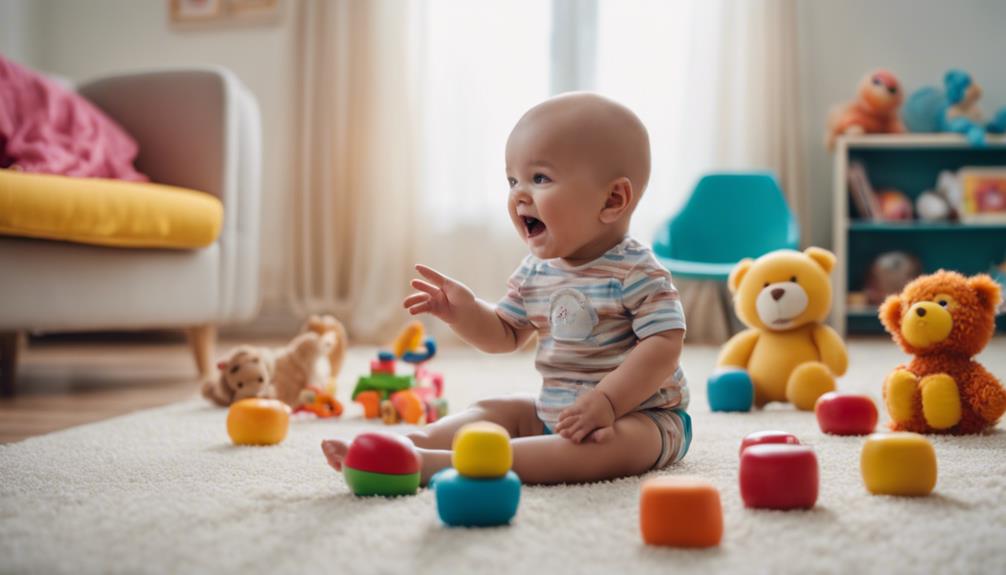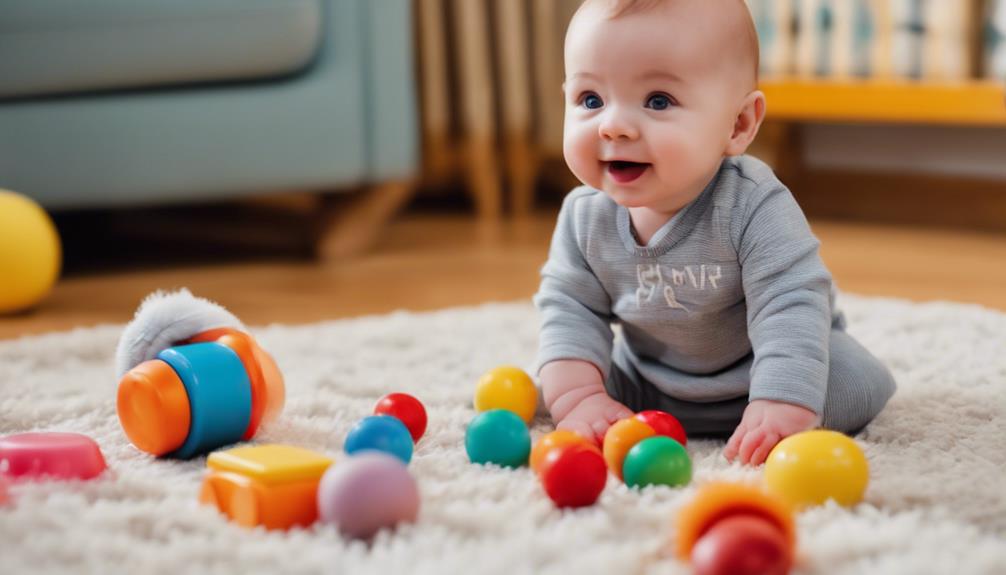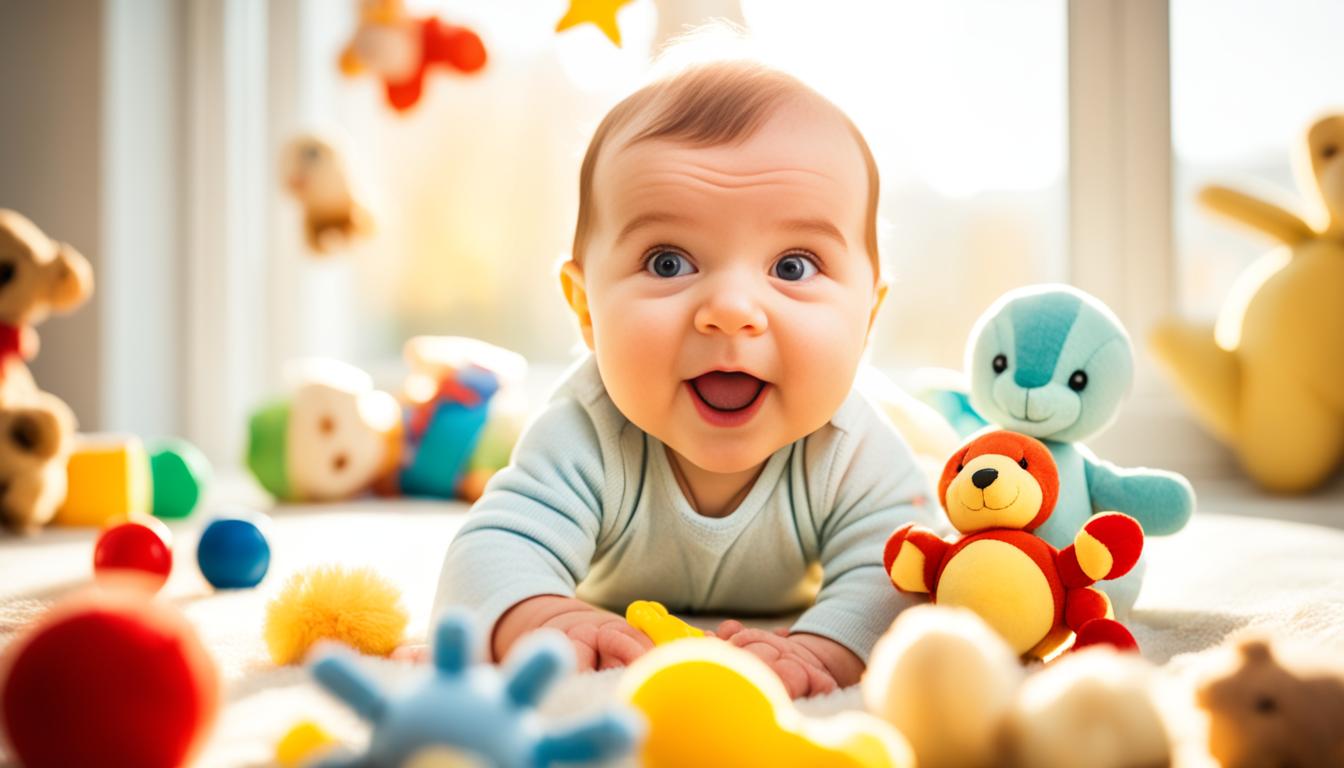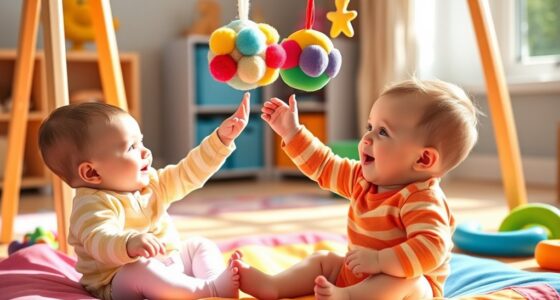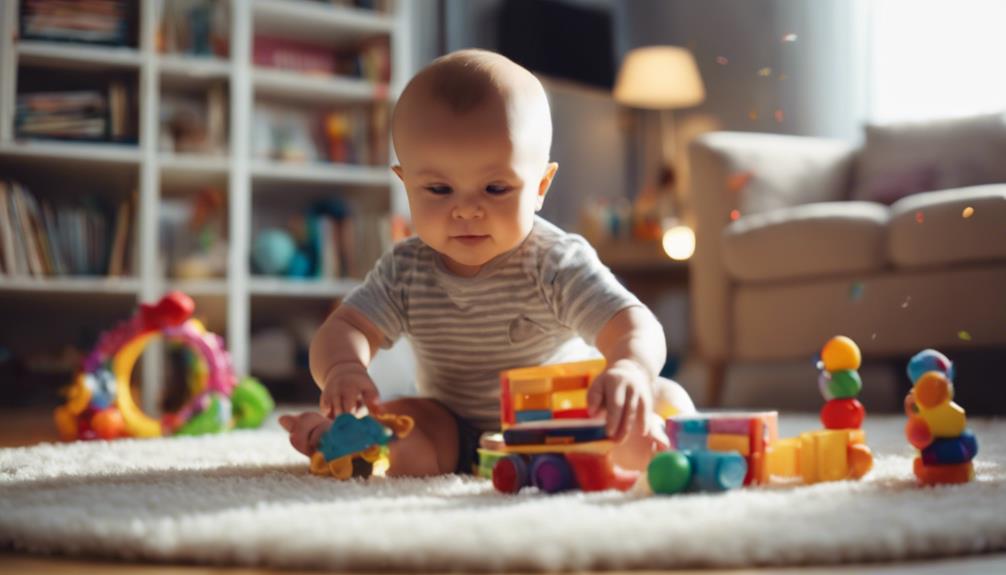By the time your baby reaches 12 months old, they begin to demonstrate social awareness and form attachments. They can recognize familiar faces and imitate sounds to engage with others. Babies start to show preferences for certain people and toys, signaling the development of emotional bonds. Simple interactions like playing peek-a-boo help in their social growth. Seeking comfort from trusted individuals and toys is crucial for their sense of security. Encouraging positive social interactions, such as spending one-on-one time together and sharing laughter, supports their development. Secure emotional bonds are formed through affection and responsive caregiving. Embracing these milestones at this stage sets the foundation for deeper connections and further growth in communication skills.
Key Takeaways
- Imitates sounds and gestures for attention and connection.
- Shows attachment through preferences for people and toys.
- Engages in interactive play to foster social skills.
- Seeks comfort and security from trusted caregivers.
- Displays affection through cuddling and physical contact.
Social Awareness and Recognition
As a caregiver, you may notice that a 12-month-old baby begins to exhibit signs of social awareness and recognition through their interactions with familiar faces and favorite toys. At this stage of development, emotional milestones play a significant role in shaping the baby's social behavior. You might observe the baby showing preferences for certain people and toys, indicating a growing sense of attachment and recognition.
The ability to imitate sounds, gestures, or actions to attract the attention of caregivers is a common social milestone seen in 12-month-olds. Additionally, behaviors like crying when separated from parents and being shy around strangers are typical social responses that demonstrate the baby's emerging social awareness. Simple actions such as helping with getting dressed by extending an arm or leg can also be observed as signs of social engagement.
Engaging in interactive games like peek-a-boo and pat-a-cake further contributes to a 12-month-old's social development by fostering connections and communication skills.
Interactive Play and Communication
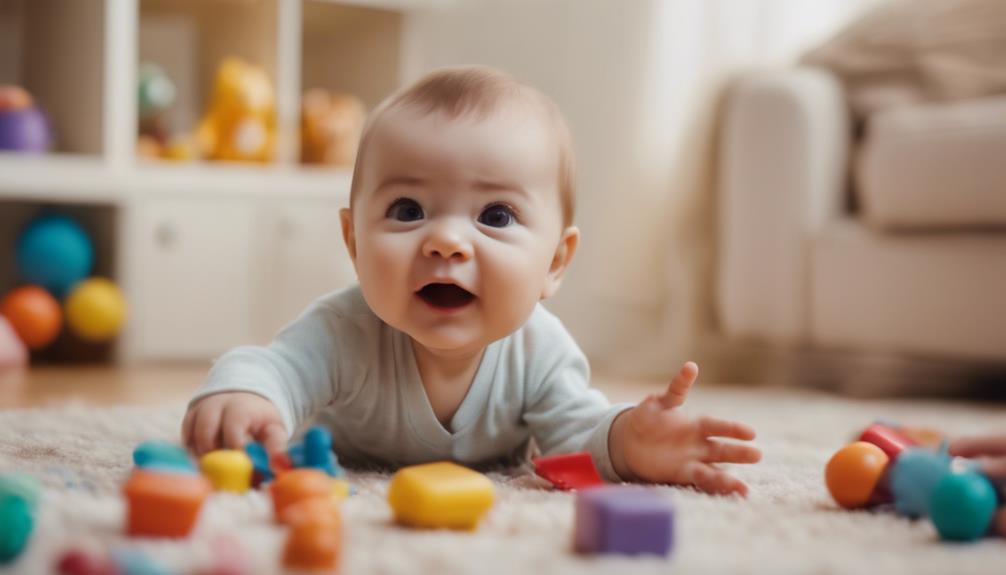
Engaging in interactive play and communication with a 12-month-old baby is vital for fostering their social and emotional development. At this age, your baby imitates sounds, gestures, and actions to grab your attention. Simple gestures like waving bye-bye or shaking their head no are common forms of communication they might use.
When you respond to their requests and encourage their attempts at speaking, you support their growing communication and social skills. Playing games such as peek-a-boo and pat-a-cake can enhance your baby's social interaction and emotional bonding with you as their caregiver.
These interactions help your 12-month-old develop essential social skills and form strong emotional connections. By actively participating in interactive play and communication with your baby, you're laying the foundation for their future social interactions and overall emotional well-being.
Attachment and Bonding Behaviors
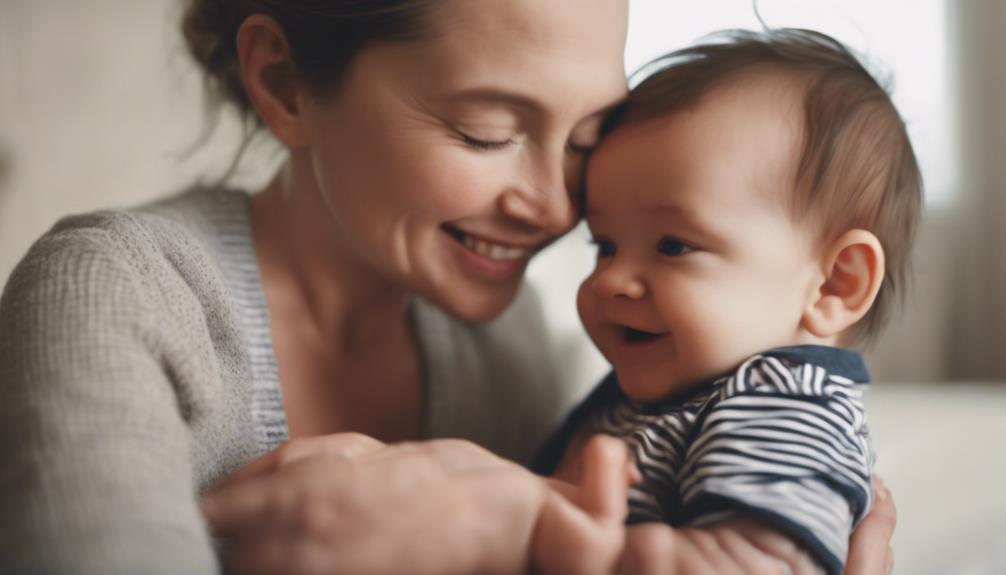
Interacting with your 12-month-old baby and engaging in play can reveal their attachment and bonding behaviors, which are essential indicators of their emotional connections and social development. At this age, your baby may show signs of attachment by preferring specific people and toys.
It's common for 12-month-olds to exhibit separation anxiety when you leave, highlighting their strong bond with familiar caregivers. Additionally, your baby might display shyness around strangers as a result of their developing attachment to primary caregivers.
Seeking comfort and assistance, such as help with getting dressed, demonstrates their reliance on trusted individuals. Favorite toys also play a significant role in their social development, as they start forming attachments to specific objects for comfort and play.
Understanding these attachment and bonding behaviors can help you nurture your baby's emotional connections and support their social development during this critical stage.
Affection and Comfort Seeking
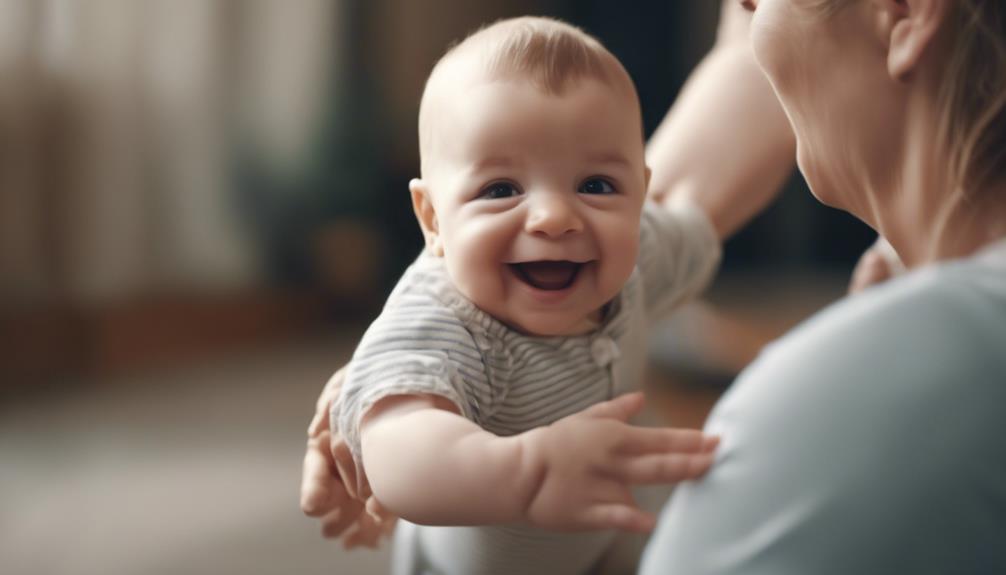
Seeking affection and comfort is an essential behavior for a 12-month-old baby, manifesting through cuddling, hugging, and physical contact with caregivers. At this stage of developmental milestones, your baby is becoming more emotionally aware and seeks simple forms of reassurance in times of distress.
It's common for babies of this age to reach out for you when upset or crying, showing their need for comfort and security. Your little one may begin to display attachment to specific caregivers, looking to them for solace and reassurance in unfamiliar or challenging situations.
These affection and comfort seeking behaviors are vital for establishing a secure emotional bond between you and your baby. By providing a nurturing and responsive environment, you help meet your baby's emotional needs, fostering a sense of safety and trust in your relationship.
Encouraging Positive Social Interactions
To promote positive social interactions with your 12-month-old baby, prioritize creating meaningful one-on-one experiences. Engaging in activities such as playing peek-a-boo, reading books together, or singing songs can help foster a strong bond and enhance social understanding. Sharing laughs during these interactions can create a positive atmosphere and strengthen your connection with your baby. Additionally, helping your baby connect words with feelings can improve their social communication skills.
Consider offering choices during playtime to boost your baby's confidence in social interactions. This simple act can empower your baby and encourage independence. Utilizing tools like the Steps Family Tool Kit can also support and promote positive social development in your 12-month-old.
| Encouraging Positive Social Interactions |
|---|
| Engage in one-on-one time |
| Share laughs during activities |
| Help connect words with feelings |
Supporting Social Development Through Play
How can play support the social development of your 12-month-old baby?
Play is an important tool for enhancing your baby's social skills and interactions. Activities like peek-a-boo, pat-a-cake, and playing with toys can help your little one learn to engage with others and understand emotions.
Encouraging your baby to imitate sounds, gestures, and actions during playtime can boost their social interaction abilities, laying a foundation for future social interactions.
One-on-one playtime provides a perfect opportunity for shared laughter, strengthening the bond between you and your baby while fostering their social development.
By responding positively to your baby's cues and expressions during play, you communicate understanding and value, which is essential for their social growth.
Through play, your baby not only has fun but also learns important social skills that will benefit them as they continue to navigate social interactions in the world around them.
Frequently Asked Questions
What Is the Development of Baby at 12 Months?
At 12 months, you're growing fast! You're showing attachment, imitating sounds, and helping with dressing. You may cry when left alone and be shy around new faces. Enjoy games like peek-a-boo for fun social development!
What Is the Personal Social and Emotional Development of a Baby at 1 Year?
Feeling ferociously friendly, you forge favorite friendships. Yearning for your loved ones, you show shyness towards strangers. Your budding independence blooms beautifully as you bravely begin to explore the world around you.
What Is Normal Behavior for a 12 Month Old?
At 12 months, you exhibit attachment, curiosity, and independence. You show shyness with strangers and enjoy social interactions like imitating sounds and playing games. Separation anxiety might arise as you become more aware of being apart from caregivers.
How Are Infants From Birth to 12 Months Are Encouraged to Socialize?
Feeling lost in a sea of curiosity, you seek connection. Engage in play, share smiles, connect words to emotions, offer choices, comfort in new situations, and mirror expressions. In these simple actions lies the key to social growth.
Conclusion
To sum up, at 12 months old, your baby is developing important social skills that will continue to grow and evolve.
Research shows that by this age, babies are able to recognize familiar faces and respond to their emotions, laying the foundation for future social interactions.
Encouraging play, communication, and bonding experiences will support your baby's social development and help them thrive in their relationships with others.
Keep fostering these connections and watch your little one blossom!

